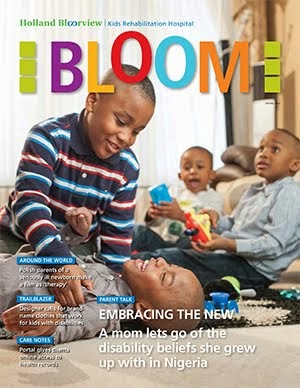As a parent, how do you define compassionate care? Have you ever broken down when describing something troubling about your child and their care?
If so, what reaction from the clinician made you, as a parent, feel cared for?
Earlier this month Holland Bloorview was the first hospital in Canada to partner with Boston-based Schwartz Center for Compassionate Healthcare.
The Schwartz Center is a non-profit organization that’s developed the Schwartz Center Rounds to give hospital employees an opportunity to share the emotions they experience when working with patients and families in the most challenging situations. The goal is to bring the humanity back to healthcare. More than 375 health facilities in the U.S. and about 100 in the U.K. are conducting Schwartz Center Rounds. Caregivers report that the program increases their empathy for patients and families and better prepares them to meet patients’ needs; improves teamwork; and decreases stress and isolation.
Non-identifying patient cases are presented and caregivers share their experiences confidentially.
At Holland Bloorview’s first Schwartz Center Rounds session, staff noted that their training hadn’t prepared them for some of the painful situations they face in supporting parents whose children have experienced life-changing trauma.
“How do you maintain your emotional composure?” asked one clinician. “Do you maintain your emotional composure? And why do I feel that I have to do that?”
Has a professional caregiver demonstrated compassion in a way that you found helpful? Please share your stories.

























4 comments:
One young doctor we met introduced himself and then said, "I see your son was born with VACTERL Association".
Then he put his hands together, bowed towards us, and simply said "Respect".
That demonstrated compassion in a way that I found helpful, unique, and unforgettable (in a good way!).
Jennifer
Jennifer -- thank you so much for sharing such a beautiful example! To me it conveyed that this doctor was acknowledging that he couldn't know what it was to walk in your shoes and he was honouring your experience. Loved hearing from you! xo
I have disabilities myself one being mild cerebral palsy on my right side. When i was younger i was followed by orthopedics more regularly. I have always understood vocabularly above my age. I was probably early teens and i really apprechiated that the ortho doc talked to me and directed what he said to me. Yes my mom was in the room but the fact that he respected that it was my body and that i was comprehending wheat he said was huge at the time. He simplified when needed but he did not dumb it down unnecessarly
A clinician doesn't always need to maintain composure, as treatment should be about balancing reason or science with empathy and compassion. Moreover, why must a healthcare provider continuously be charged with treating a patient? For, in the right setting, could a clinician and patient not heal each other?
I really need to write another post for BLOOM.
"Our greatest link will forever be our common humanity."
Matt Kamaratakis
Post a Comment